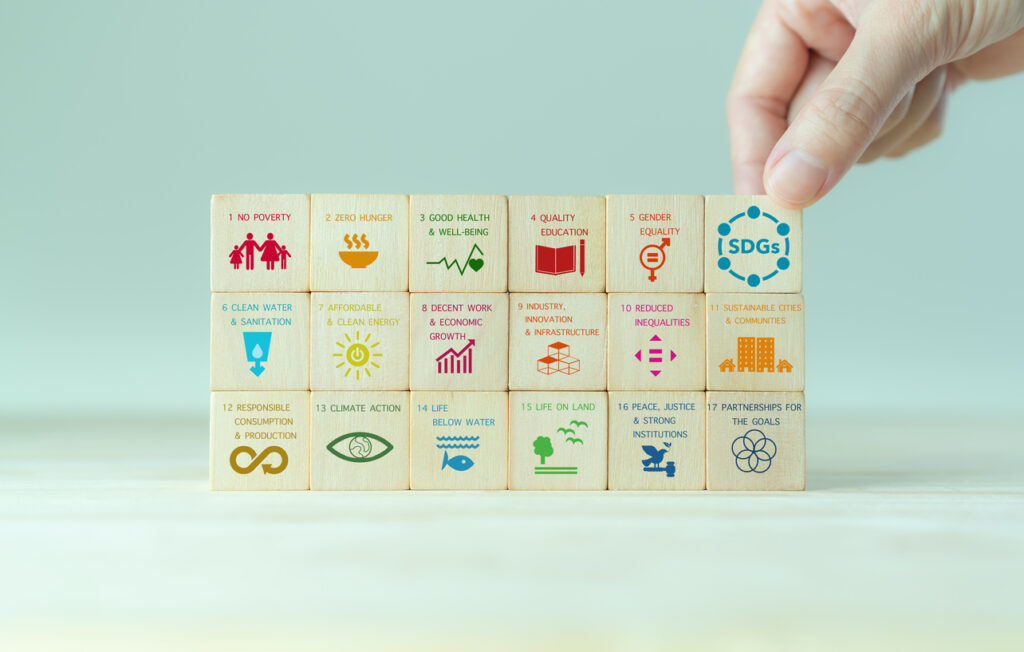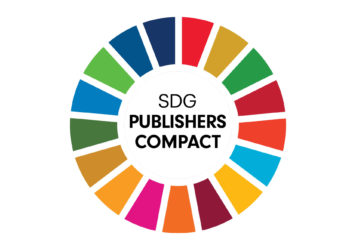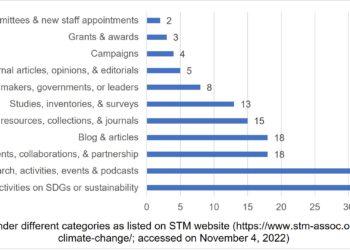The year 2023 is the exact midpoint of the ‘SDG era’ — a period that started in 2016 after the world’s governments agreed upon the United Nations Sustainable Development Goal (SDG) Framework for the next 15 years. Scholarly publishers have been publishing research on sustainable development and sustainability since long before then, but a collective, global effort by the publishing industry to support the SDGs only started in October 2020 at the Frankfurt Book Fair. This effort, known as the SDG Publishers Compact, is a joint initiative of the UN and the International Publishers Association (IPA). By becoming a signatory to the Compact now, a publisher, a journal, an academic institution, or a publishers association promises to implement 10 action points to take the SDG implementation forward over the next eight years or so.
On February 19, 2023, the Compact had 285 signatories (Europe 139, Asia and the Pacific 62, the Americas 59, Africa 19, and the Middle East 6), of which about 15 are publishers associations, mostly based in European countries. In the following sections, based on publicly available information, I try to bring together a few examples of how some international publishing associations are taking actions towards the SDGs for and with their members.

Association of Learned and Professional Society Publishers (ALPSP)
- Joined the SDG Publishers Compact in October 2020 as one of the first signatories.
- Launched in 2020, jointly with Cambridge University Press, the University Press Redux Sustainability Award.
- Having diversity and sustainability as the core theme, the ALPSP University Press Redux 2022 conference dedicated sessions on the supply chain in publishing with a vision to becoming carbon neutral, and on business-related traveling and its environmental implications.
- Had two sessions at its annual conference 2022 exclusively linked to the SDGs: i) How can ALPSP members help achieve the SDGs?, and ii) Measuring publishers’ impact on attaining the SDGs.
European Association of Science Editors (EASE)
- Joined the Compact, along with its journal (European Science Editing), in May 2021.
- Has an Environment and Sustainability Committee since Spring 2021 as one of four special interest committees. [Disclosure: I have recently become a member of this committee].
- Has an organizational Environmental Policy.
- Had virtual EASE Conference 2021 on the theme ‘Promoting sustainability in scholarly publishing: the role of editors.’
- Published an Environmental Manifesto to help members and wider publishing community to be environmentally responsible in terms of adopting an Environment Policy, shifting from print to digital, and improving journal distribution, office management, food and drink, employee management, building management, and editors’ role as gatekeepers.
- Has conducted a survey with HESI SDG Publishers Compact Fellows during October-November 2022 among the editors and other scholarly publishing entities to measure the progress of the Compact implementation. The survey report is expected in Spring 2023.
- Has been planning to establish an Environment and Sustainability Community and Forum.
International Publishers Association (IPA)
- Launched the SDG Publishers Compact jointly with the UN.
- Established in 2021 the SDG Dashboard acting as a repository of resources related to all 17 SDGs. A previous Scholarly Kitchen post took a look at these resources.
- Organized the Second Sustainability Summit at the Frankfurt Book Fair 2022, which discussed many issues, including the SDG Book Club, the 2030 Publishing 2030 Accelerator, and the prototype carbon label for an individual book.
- The Summit also discussed the survey results on the SDG Publishers Compact signatories conducted by the UN. The detailed survey results are yet to be made public.
STM Association
- Joined the Compact.
- Now has a website with dedicated webpages on the UN SDGs and climate action capturing members’ efforts and good practices.
- Endorsed SDG Publishers Compact Fellows’ Top Action Tips for Academic Publishers, Editors and Reviewers.
- Established in 2022 the SDGs Academic Publishers Forum “to provide tools to the broad STM membership to ensure that as an industry, science, research and education accelerates the progress needed to achieve the SDGs by the deadline of 2030.”
- This Forum has decided to focus its activity on what its members publish since “curating and disseminating professional content is the area where publishers can reach the highest impact and make the difference.”
- And, it is currently developing the STM Sustainability Roadmap for its members to guide them to implement the Compact and the Top Action Tips.
Some publishers associations, such as the Society for Scholarly Publishing (SSP), have yet to become a signatory to the SDG Publishers Compact and at the moment don’t have working groups or committees on sustainable development or sustainability issues. Of course, as a founding member of the C4DISC initiative, the SSP is very strong in the Diversity, Inclusion, Equity, and Accessibility (DIEA) arena, including establishing the SSP Generations Fund to support its DIEA and other programs.
From the above examples we can see publishing associations are taking a wide range of approaches and actions to contribute towards the SDGs. Some actions, such as committing to the Compact, is common among many associations. Having relevant internal policies in place; establishing committees or working groups to lead the organizational sustainability work; preparing manifestos, guiding principles, or tools for the members; creating repositories of existing tools, good practices, or members’ initiatives; organizing conference sessions on sustainability or the SDG-related themes; and introducing awards to recognize commendable achievements are some of the good practices which could be adopted across the industry.
Collaboration is a key to progressing towards the SDGs. And associations are the best place for initiating and harnessing such industry-wide cooperation. We need to ensure transparency and accountability at every step as we publicly declare our commitment towards the SDGs and put our efforts and resources together. We therefore urgently need to measure the progress of implementing the SDG Publishers Compact across the signatories.
The third action point of the Compact states “Annually reporting on progress towards achieving SDGs, sharing data and contribute to benchmarking activities, helping to share best practices and identify gaps that still need to be addressed.” In a Scholarly Kitchen piece back in July 2022, while reviewing the progress of the SDG Publishers Compact’s implementation, I also highlighted the need for a stock-taking of the Compact implementation to measure the changes in the coming years. We now hope that, over the next few months, the two surveys already conducted by EASE/HESI, and the UN will be able to give us the first pictures of how we are doing in terms of implementing the SDG Publishers Compact. These should also help us to draw new baselines and guide our directions and pace towards the SDGs through innovation, collaboration, and investment.



